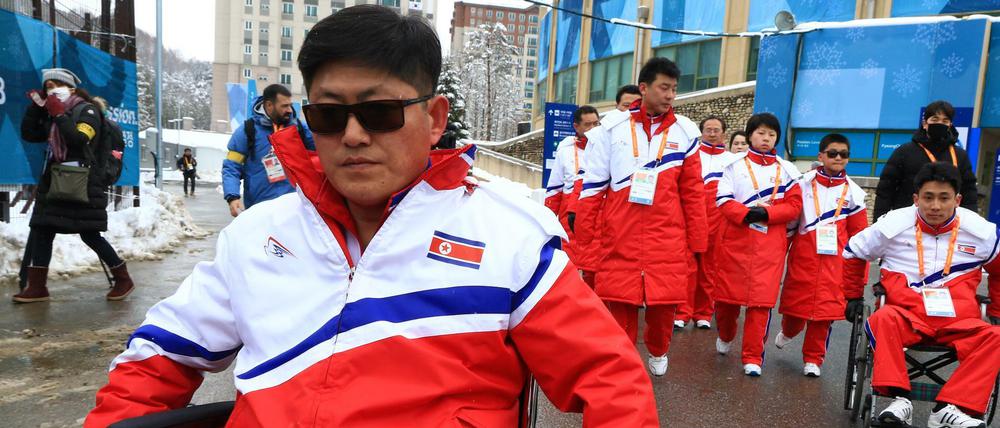
© Thilo Rückeis
Paralympics in Pyeongchang: North Korea at the Games
As a nation full of mysteries, North Korea remained secluded throughout the Games in Pyeongchang.
As a nation full of mysteries, North Korea remained secluded throughout the Paralympics Games in Pyeongchang. Despite being perhaps the most watched team among the 48 participant countries, its athletes and officials all remained tight-lipped whenever they were asked any questions. The athletes were accompanied by a handful of cheering squad from the North in the stadium on March 11, when the qualification round for Men’s 15 km cross-country skiing took place. Waving their national flag with expectant looks on their faces, they cheered loudly whenever North Korean athletes were shown on the screen.
However, they were separated from the rest of the audience with a fence and no interactions were allowed. South Koreans were not allowed to speak to them unless they have filed a report for contacting North Koreans in advance. Instead of direct conversation, some took pictures of the squad and others glanced over curiously. Some non-Koreans who attempted to conduct interviews were asked to come back after the games have finished. However, the crowd left shortly before the games have officially ended. The cheering squad did not show up for the second event, Men’s 1.1km sprint, on March 14, when the South Korean president Moon Jae-in was on site to cheer for the Korean athletes.
Despite the sudden influx of questions when the North Korean athletes were passing by, the athletes refused to answer any questions. In an interview with Eui Hyun Sin, a South Korean athlete who won a bronze medal in Men’s 15km, Sin answered “they are younger than me, so I encouraged them before the games,” to a question asking whether there had been any contact between the South and North athletes. He also expressed a hint of regret for the two Koreas not competing as a unified team.
Long Journey to the South
Pyongyang has switched its stance on participating in the Games multiple times in the days leading up to the Paralympics. The final decision to participate came only in late February after the inter-Korean talks at Panmunjom and the decision from the International Paralympic Committee (IPC) to grant them two bipartite slots. After the Paralympics in London 2012 and Rio 2016, the only Games the country has participated in so far, it is the first time the North has showed up for the Winter Games. It sent a delegation of 24 to PyeongChang.
Among the six athletes, only two actually competed in the Games. The athletes, Jong Hyon Kim and Yu Chol Ma, were both involved in para table tennis before they took up cross-country skiing, the discipline they competed in PyeongChang. According to their official profiles, they only started cross-country skiing in December 2017. Both athletes participated in two events. In Men’s 15km, Ma ranked 26th and Kim 27th. In Men’s 1.1km sprint, Ma and Kim ranked 31st and 32nd respectively.
Hopes for the Future?
The stadium was full of spectators cheering for the athletes. Waving the unified flag, the Inter-Korean Supporters occasionally shouted their slogan “we are one” and “unified homeland” and cheered for athletes from both nations. Pyongyang’s participation in the Paralympics is symbolic not only in terms of inter-Korean relations. North Korea is known for its violation of human rights, especially with people with disabilities. As the regime views such people as the ones who cannot function properly, they are regarded less loyal to the Workers’ Party. Therefore, its participation in the Paralympics could foreshadow improving treatments for people with disabilities in the North.
After the game, president Moon expressed his gratitude for the two athletes from North Korea. “Thank you for your hard work,” he told the athletes, according to a briefing from the Blue House. He also said that he hopes the two Koreas will facilitate interactions regarding sports.
This text was also published in German in the "Paralympics Zeitung" of the Tagesspiegel. Its author is part of the young journalist team that was in South Korea at the Paralympics.
Dieser Text ist in deutscher Sprache auch in der "Paralympics Zeitung" des Tagesspiegels erschienen. Seine Autorin ist Teil des Nachwuchsjournalisten Teams, das in Südkorea bei den Paralympics war.
Jo Sooyeon
- showPaywall:
- false
- isSubscriber:
- false
- isPaid:
- showPaywallPiano:
- false